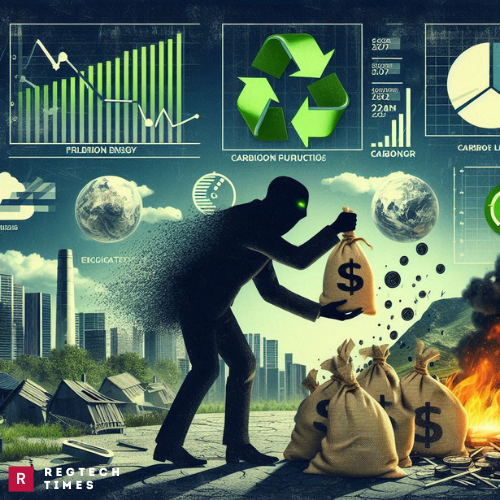Germany’s carbon credit market, a crucial tool for reducing global greenhouse gas emissions, is currently engulfed in a scandal that could undermine years of climate action. A shocking $5 billion has reportedly been lost due to fraudulent carbon reduction projects, casting a dark shadow over the efficacy of carbon offset programs and raising serious questions about regulatory oversight.
Understanding Carbon Credits and the Scandal
Carbon credits are a mechanism that allows companies to offset their emissions by investing in projects that purportedly reduce greenhouse gases elsewhere. The concept is simple: firms that cannot fully cut their emissions on their own invest in projects that remove or reduce carbon dioxide from the atmosphere, thereby achieving a net reduction in global emissions.
Germany’s program, designed to help major carbon producers like Shell and other oil companies comply with emission reduction targets, relies heavily on these credits. The system permits companies to meet up to 1.2% of their emissions reduction requirement through investments in carbon reduction projects abroad.
However, recent revelations have exposed a significant flaw in this system. Reports indicate that many of these projects are fraudulent or misleading. Investigations have uncovered that a substantial number of these projects, particularly those based in China, are either non-existent or fail to deliver the promised emissions reductions.
The Scale of Fraud
The scandal came to light through various sources, including whistleblowers and satellite imagery. One particularly egregious example involved Shell, which was reportedly misled into investing in a carbon reduction project that turned out to be a chicken farm. Such revelations have contributed to an estimated $5 billion in losses for companies that invested in these dubious projects.
Further scrutiny has revealed that many projects in China, along with some in Azerbaijan and Nigeria, were either exaggerating their effectiveness or were outright fraudulent. A December report from German outlet Handelsblatt indicated that half of the projects in China are likely fake or misrepresent their results. An industry insider claimed that 27 projects from China alone showed clear signs of massive irregularities and fraud.
Implications for the Carbon Market
This scandal has far-reaching implications for both the carbon credit market and global climate initiatives. The carbon credit system is designed to incentivize companies to reduce their emissions in a cost-effective manner, leveraging global efforts to combat climate change. However, the exposure of such widespread fraud undermines trust in these mechanisms.
Michelle Leach-Bard Sentenced for Employment Tax Fraud and 401(k) Embezzlement
For businesses and investors, the loss of $5 billion represents not just a financial setback but also a significant blow to their reputations. The realization that a substantial portion of their carbon offsets may have been worthless or fraudulent could lead to increased scrutiny and skepticism about the effectiveness of similar programs worldwide.
Regulatory Failures
One of the most troubling aspects of the scandal is the apparent failure of regulatory bodies to adequately oversee and verify these projects. Compliance with emissions reduction targets in Germany is legally mandated, and the discovery of such extensive fraud raises serious questions about why oversight mechanisms were not more robust.
Regulators are expected to ensure that carbon credits represent real and verifiable emissions reductions. The fact that these fraudulent projects were able to pass through verification processes and receive approval indicates a significant lapse in regulatory oversight.
The Path Forward
Addressing the fallout from this scandal will require comprehensive reforms. First and foremost, there needs to be a rigorous review and overhaul of the verification processes used to assess carbon reduction projects. Improved transparency, more stringent auditing, and better enforcement mechanisms are essential to restoring confidence in carbon offset programs.
Moreover, there needs to be a broader push for greater accountability and oversight in carbon markets globally. This scandal highlights the necessity for robust regulatory frameworks that can effectively prevent and address fraud, ensuring that climate action remains credible and effective.
Germany’s $5 billion carbon credit scandal serves as a reminder of the challenges and vulnerabilities in the fight against climate change. While it emphasizes the importance of vigilance and integrity in carbon markets, it also presents an opportunity to strengthen the mechanisms that are crucial for achieving global emissions reduction goals. As the world grapples with the implications of this scandal, it is imperative that reforms are implemented to safeguard the future of carbon offsetting and maintain the integrity of global climate initiatives.


